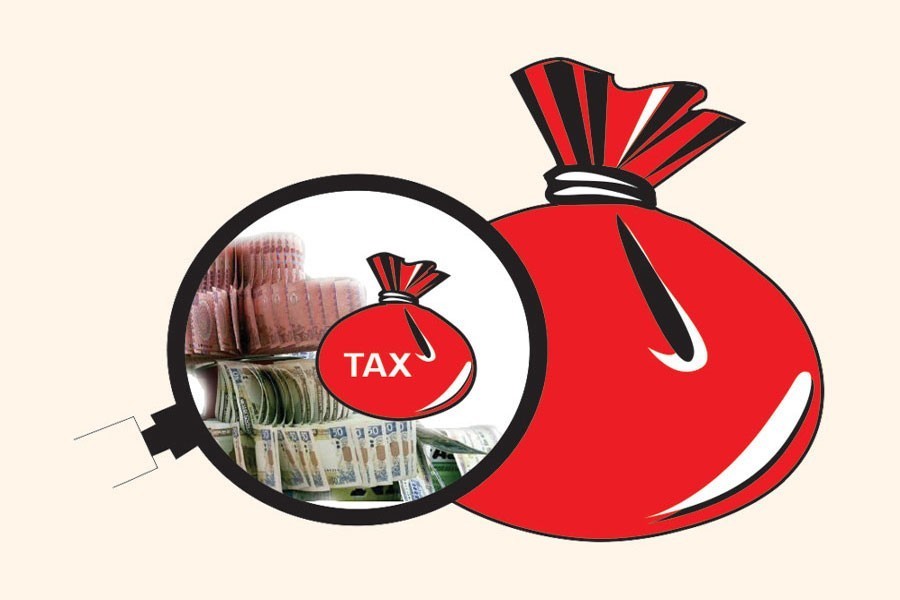Achieving the tax collection target set by the National Board of Revenue or NBR for fiscal year 2020-21 is "impossible," analysts said calling the goal "unrealistic."
They made the remarks while speaking at a virtual news conference on "Challenges of Policymaking in Times of Pandemics," organized by the Centre for Policy Dialogue or CPD, a think tank.
They said the tax authority sets this unrealistic target to hide mismatch in income and expenditure in the budget.
" … the practice here is that the government sets the target for expenditure first, then sets the source of finance," said distinguished fellow of the CPD Prof Mustafizur Rahman.
As part of the CPD's Independent Review of Bangladesh's development programme, it put forward its recommendations for its interim review of the national economy.
Prof Rahman said the government has set 56 per cent higher revenue target for next fiscal year when pandemic continues to rage, which is "impossible" and "unrealistic."
He said if GDP is 8.0 per cent, inflation is 6.0 per cent then 14 per cent is a natural growth of revenue.
"Then if you put lots of efforts, it may go up to 20 to 21 per cent, but revenue target for such a year has been set at 56 per cent," he wondered.
"We all agree and know in our consciousness that this target is not achievable," he said.
The government has set a Tk 3.30-trillion revenue collection target for the NBR for fiscal year 2021.
The target is 1.35 per cent higher than that of the original goal of Tk 3.25 trillion and almost 10 per cent higher than the revised target set at Tk 3.0 trillion for the outgoing fiscal year.
The budget for fiscal year 2020-21 is set to be rolled out on June 11.
However, in its paper, the CPD estimated a revenue shortfall of around Tk 1.25 trillion for FY2020.
This implies, the revenue earnings in FY2020 is likely to record a minuscule growth of 0.4 per cent; hence, the revenue-GDP ratio may see a decline, according to the CPD paper.
Replying to a question whether the revenue target for 2021 is achievable, CPD executive director Dr Fahmida Khatun echoed her colleague's assumption, saying achieving this target is not possible.
"We have been witnessing that in the last few years the targets of revenue earning have been missed," she said.
"People lost jobs, business is declining, income of people is decreasing during coronavirus pandemic, so this target of revenue will not be successful," she said.
CPD research director Dr Khondaker Golam Moazzem said the problem is not targeting the unrealistic revenue goal alone.
The situation worsens when expenditure targets are set based on this unrealistic income target, prompting projects to seek their funds from the finance ministry, he said
"And consequently, many urgent needs do not get emergency funds," he added.
In its keynote papers the CPD said, the country's gross domestic product or GDP is likely to crash to 2.5 per cent from the original estimate of 8.2 per cent for the outgoing fiscal year as fallout of Covid-19.
The government should not worry over it rather it should concentrate on protecting lives and livelihoods of the people, it suggested.
The CPD said the poverty rate jumped to 35 per cent from 24.3 per cent in 2016.
The CPD said inequality both in consumption and income has widened in the aftermath of the pandemic.
It estimates that the Gini coefficient for consumption rose to 0.35 versus 0.32 in 2016. The coefficient, a measure of estimating inequality, increased to 0.52 now against 0.48 in 2016.
If the value rises, inequality rises and vice versa.
The CPD suggested the minimum threshold for income taxes should be Tk. 350,000 instead of Tk. 250,000.
It also suggested that the lower slab of taxes should be 5.0 per cent, which will help foster domestic demand.
Criticising the ad-hoc basis of incentives, the CPD said there is a need for rational adjustment on such measures.
Senior research fellow of the CPD Towfiqul Islam Khan presented the keynote at the briefing, moderated by executive director Dr. Fahmida Khatun.
Mr Khan said the government should exercise 'cost benefit analysis' before offering new incentives.
The researcher proposed depreciation of local currency against US dollar, arguing the devaluation will help boost exports and remittances.
"Our inflation now remains comparatively low and the deprecation may be justified," Mr Khan said.
On the upcoming budget, the CPD said the health sector should be given top priority for fiscal year 2020-21.
The researcher said the marginal people, agriculture and SMEs should also get priority considering their vulnerability, amid the coronovirus pandemic.
He feared budget deficit will be widened in the next fiscal.
"We usually try to keep the deficit within 5.0 per cent of GDP, but it may reach 7.0 to 8.0 per cent for the next budget," Mr Khan, said while presenting the keynote.
The CPD said the government should explore new opportunities for foreign funding, including the latest G-20 package.
It said the annual development programme should favour projects with foreign funding and those create job for employment.
The CPD noted the rate of budget implementation usually ranges from 80 and 85 per cent.
Researcher advocated adequate allocation for food budget to rein in the future price escalation of the essentials.
They also advocated effective and timely implementation of government-sponsored economic relief packages.
The CPD reiterated that the provision of undisclosed money or whitening black money should be stopped as it demoralises the genuine tax payers.
The CPD said four priority areas should be considered in this budget and they are health sector, agriculture, social safety net and employment.


